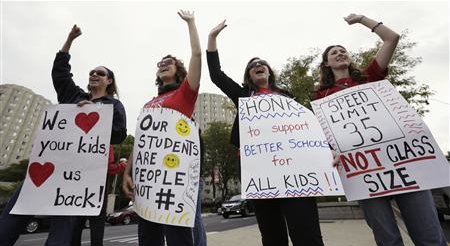Chicago Teachers’ Strike, Performance Evaluation, and School Reform (Jack Schneider and Ethan Hutt)
For the fifth consecutive day in Chicago, nearly 30,000 teachers are out on strike. At issue are many of the contractual details that typically complicate collective bargaining—pay, benefits, and the length of the work day. But the heart of the dispute roiling the Windy City is something relatively new in contract talks: a complicated statistical algorithm.
District leaders in Chicago, following the lead of reformers in cities nationwide, are pushing for a “value-added” evaluation system. Unlike traditional forms of evaluation, which rely primarily on classroom observations, policymakers in Chicago propose to quantify teacher quality through the analysis of student achievement data. Using cutting-edge statistical methodologies to analyze standardized test scores, the district would determine
District leaders in Chicago, following the lead of reformers in cities nationwide, are pushing for a “value-added” evaluation system. Unlike traditional forms of evaluation, which rely primarily on classroom observations, policymakers in Chicago propose to quantify teacher quality through the analysis of student achievement data. Using cutting-edge statistical methodologies to analyze standardized test scores, the district would determine

